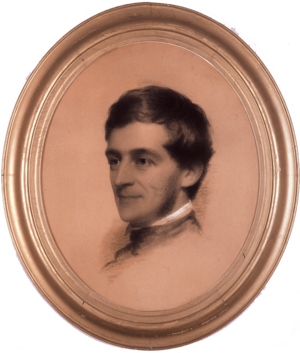Self-Reliance facts for kids

"Self-Reliance" is a famous essay written in 1841 by an American thinker named Ralph Waldo Emerson. He was part of a group called the Transcendentalists. This essay shares one of his most important ideas: that each person should be true to themselves. It teaches us to avoid just following what everyone else does. Instead, it encourages us to listen to our own thoughts and ideas.
One of the most well-known lines from the essay is:
- "A foolish consistency is the hobgoblin of little minds, adored by little statesmen and philosophers and divines."
This means it's not always good to stick to old ideas just because they're old. It's better to think for yourself. Emerson's essay explores the idea of trusting your inner self. He believed that being an individual helps you find happiness in life. He also said that life is about "learning and forgetting and learning again."
Contents
The Story Behind "Self-Reliance"
Ralph Waldo Emerson first shared ideas that would become "Self-Reliance" in a sermon. This was in September 1830. He gave this sermon a month after he got married for the first time.
From 1836 to 1837, Emerson gave many talks in Boston. These talks were about the history of ideas. Many of the thoughts from these talks later appeared in "Self-Reliance." They also showed up in other essays he wrote.
Emerson's ideas were sometimes seen as very new and different. His strong belief in each person's unique value might have been a way to respond to people who disagreed with him. "Self-Reliance" was first printed in 1841. It was part of his book called Essays: First Series.
Emerson helped start the Transcendentalist movement in America. This movement focused on ideas like individualism, personal responsibility, and not just following the crowd.
Emerson had a strong religious background. His father was a minister. Emerson also became a minister. But his beliefs were often very new and different for his time. He understood that people are all unique. He also knew that ideas are always changing. He wanted religious people to bring "new life" into their old traditions.
The Transcendentalist movement grew strong in New England. It offered a new way of looking at life. This new way combined older ideas from Romanticism and German Idealism. It also used American ideas about freedom. These ideas fit well with American values at the time. They included valuing nature, individualism, and making things better. You can see these values clearly in Emerson's essay.
Key Ideas in "Self-Reliance"
Emerson's essay talks a lot about the power of the individual. He believed that nothing should have more power over you than your own self. He thought that true understanding comes from looking within yourself. It does not come from just reading history. He felt that truth is inside each person. This inner truth is more important than rules from groups or religions.
The main idea that Emerson keeps coming back to in "Self-Reliance" is: "Trust thyself."
Be Yourself: Nonconformity
One of the biggest ideas in the essay is not conforming. This means not just doing what everyone else does. Emerson says:
- "Whoso would be a man must be a nonconformist."
He tells his readers to do what they think is right. It doesn't matter what other people think. He wants readers to be free from pressure to fit in. He encourages them to be true to their own nature.
Finding Peace: Solitude and Community
Emerson also writes about being alone and being with others. He felt that being around too many people can stop you from growing as a person. Things like friendly visits or family needs can be distractions. He suggests spending more time thinking about yourself.
But he also believed you can be yourself even in a crowd. This happens when you have strong self-confidence. He mentions that "the great man is he who in the midst of the crowd keeps with perfect sweetness the independence of solitude." This means a truly great person can stay true to themselves, even when surrounded by many others.
Inner Truth: Spirituality
The idea that truth is found within yourself is a big part of Emerson's essay. He thought that relying only on organized religion can stop you from growing mentally. He believed your own inner spirit is your guide.
Living Your Own Way: Individualism
The theme of individualism is very important in "Self-Reliance." Emerson explains that true happiness comes when you live your life based on your own values. He emphasizes: "Nothing can bring you peace but yourself. Nothing can bring you peace but the triumph of principles." This means finding peace comes from your own inner strength and beliefs.
Be Original: Don't Imitate
Emerson also talks about being original versus just copying others. Near the end of the essay, he tells society: "Insist on yourself; never imitate." He wants everyone to be unique and follow their own path.
 | William L. Dawson |
 | W. E. B. Du Bois |
 | Harry Belafonte |

